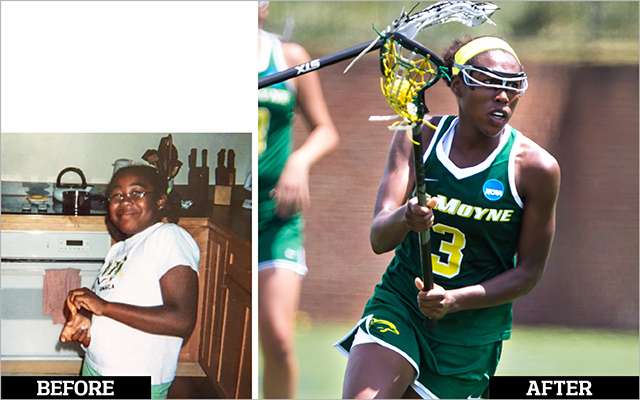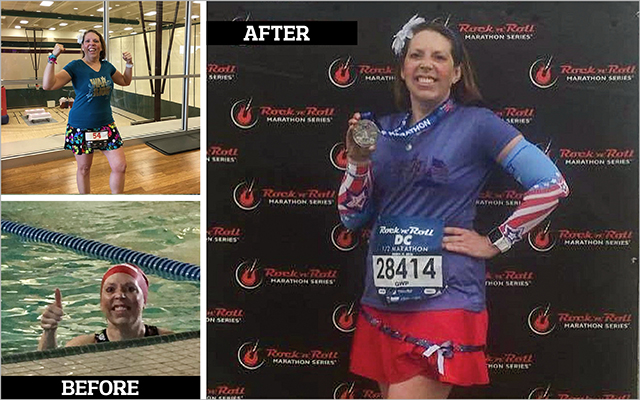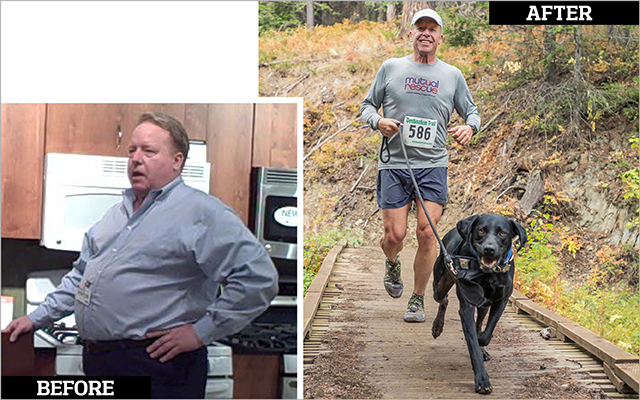I’ve always found comfort in food. Every Friday when I was growing up, my family would gather together for pizza and a movie. Before dance class, I always ordered a fish sandwich and onion rings from Burger King. When I felt sad, my solution was a pint of Chunky Monkey ice cream. As long as flavor and texture flooded my senses, everything felt all right.
The first time I thought about my weight was at summer camp when I was 8. As I looked at the girls lined up on the lakeside dock, I could see their flat stomachs peeking out from their bikinis. My rounder belly was covered by a tight one-piece.
When I returned from camp, I started to question my appearance. Was I too large? Was my skin too dark? Was my hair too kinky? In most situations when I was growing up, I was the token black girl. I was the only speck of color in the room, and I was conspicuous: big hair, big glasses, big stomach. I practiced lowering my voice and relaxing my hair to blend in. Still, I always felt like I stood out.
Growing Hungry
In fifth grade, a classmate started a rumor that I was pregnant. I knew it was ridiculous, but I felt humiliated. That’s when I started hating my body.
I avoided mirrors and began to find comfort in baggy clothes that made me seem shapeless. When I started playing lacrosse two years later, I discovered a new way to hide.
With each practice, I lost a bit of weight. I loved feeling lighter, and I intended to stay that way. So I stopped eating breakfast. Then I traded lunch in the cafeteria for reading in the library. My mom would mention how tiny I was with a note of concern in her voice, so I made sure to have dinner with my family every night so she could see me eat.
My inconsistent eating habits also included episodes of bingeing. When the empty feeling became too much to bear, I would blindly fill my stomach with whatever was in the house, snacking until my abdomen ached.
I was doing everything I could to control the way people saw me. It was like wall ball, a drill we did at lacrosse practice. I was throwing the ball harder and harder at the bricks to test my reflexes. I enjoyed the emptiness in my stomach because I thought it meant that I was winning. The only thing is, you can’t beat a wall.
The Breaking Point
I learned the hard way that being skinny doesn’t equal happiness. People complimenting my looks didn’t make me feel prettier. Chasing after other people’s acceptance didn’t increase my self-worth. When I thought I was my best self, I felt the most isolated, paranoid, and depressed.
My anxiety was a nagging voice in my head. Every time someone commented on my body or how my speech made me “sound white,” that voice grew louder. And because I didn’t want to give anyone the chance to judge me, I hid myself away. I stopped going out with my friends and instead spent weekends in bed, feeling weak and exhausted.
I wasn’t at my best on the lacrosse field either. I wanted to be the kind of player who went home from practice to do more drills, but I was too drained from obsessing about my body.
Then, in the spring of my sophomore year of high school, when I desperately needed something good in my life, I made the varsity team. It pushed me to rethink my priorities.
My new coach had introduced me to the sport when I was in middle school. He spotted a talent in me that I had never considered, and I didn’t want him to see me as unfulfilled potential.
My whole life, I had viewed my body as a problem. But the way my coaches talked about the power in my muscles made me want to believe in myself. The more strength I had in my legs, the more stable I’d be when attackers tried to maneuver around me. The more brawn in my shoulders, the harder I could drive toward the goal.
Every part of me had a purpose, even the parts I hated. My coaches consistently focused my attention on enhancing the power I already had — and so I started to believe that what I had was pretty great.
But what I loved most about lacrosse was that it wasn’t about my weight or my skin or how “white” my voice sounded. I didn’t feel like a spectacle on the team. I was just another girl with a stick, working toward a goal with my teammates — and that was liberating.
Connecting to Health
To live up to my potential on the field, I had to change my relationship with food. I started getting up earlier to make breakfast, which was usually eggs or a yogurt parfait with pears and cashews. Then, I began snacking between classes. When I traded Gushers and Cheetos for fruit and nuts, I felt more satisfied, so I wasn’t starving when I sat down to eat lunch.
After watching a few eye-opening documentaries in health class about the food system, I started making my own lunches, too. I wanted to eat more produce and stay away from packaged fare.
I’d never realized there was so much room for creativity in meal preparation. It was fun to play with new seasonings and to see how colorful I could make my salads. I experimented with different vegetables, such as asparagus and squash, and started eating protein regularly because it helped me feel full.
Gradually, those foods became the center of my meals. Instead of spending Saturday mornings in bed, I visited the farmers’ market, which helped me understand the benefits of buying local.
Most importantly, my new eating habits allowed me to be more present in my life. I wasn’t distracted during practice by fantasies about what I could eat for dinner, and I wasn’t preoccupied with hunger pangs during classes. I could stay in the moment, concentrate on what was in front of me, and have the energy to execute plays.
I started spending more time with my friends, and each time I left the house to go somewhere new or meet up with someone, I felt more confident. When I eventually gained some weight as a result of my healthier diet and increased muscle, I wasn’t alarmed. I could feel the strength in my body, so it was easier to let go of my self-conscious tendencies.
For the first time, my sense of self was connected to something internal — the choices I was making and the new energy I was bringing to my life — rather than my appearance.
There have been times over the past few years when I’ve slipped into old habits. And I still have moments of uncertainty, when I struggle to look in the mirror and the anxious voice in my head grows louder.
The difference is that now, at 23, I can recognize those moments of weakness and choose to show myself love. I feel more at ease in my body and have a greater sense of self-worth, so I’ve learned to move through anxiety by leaning on what I know about myself: I’m strong and smart and worthy.
This originally appeared as “Full Strength” in the May 2018 print issue of Experience Life.
Amari’s Top 3 Success Strategies
Practice self-love. Avoiding mirrors fueled Amari’s distorted body image. “Now, every day, I study my reflection and note the parts of me I love,” she explains, “because I know that my body deserves respect and appreciation.”
Treat yourself. “As long as you’re thoughtful about what you’re eating 80 percent of the time, it’s OK to indulge the other 20 percent,” she advises. “If I’m craving a cheeseburger, I can go for it with no regrets.”
Make it fun. It’s hard to stick with a habit you hate. “I love reframing exercise with fun activities like tennis or yoga. Instead of dreading my morning workout, I wake up excited to try something new!”




This Post Has 0 Comments